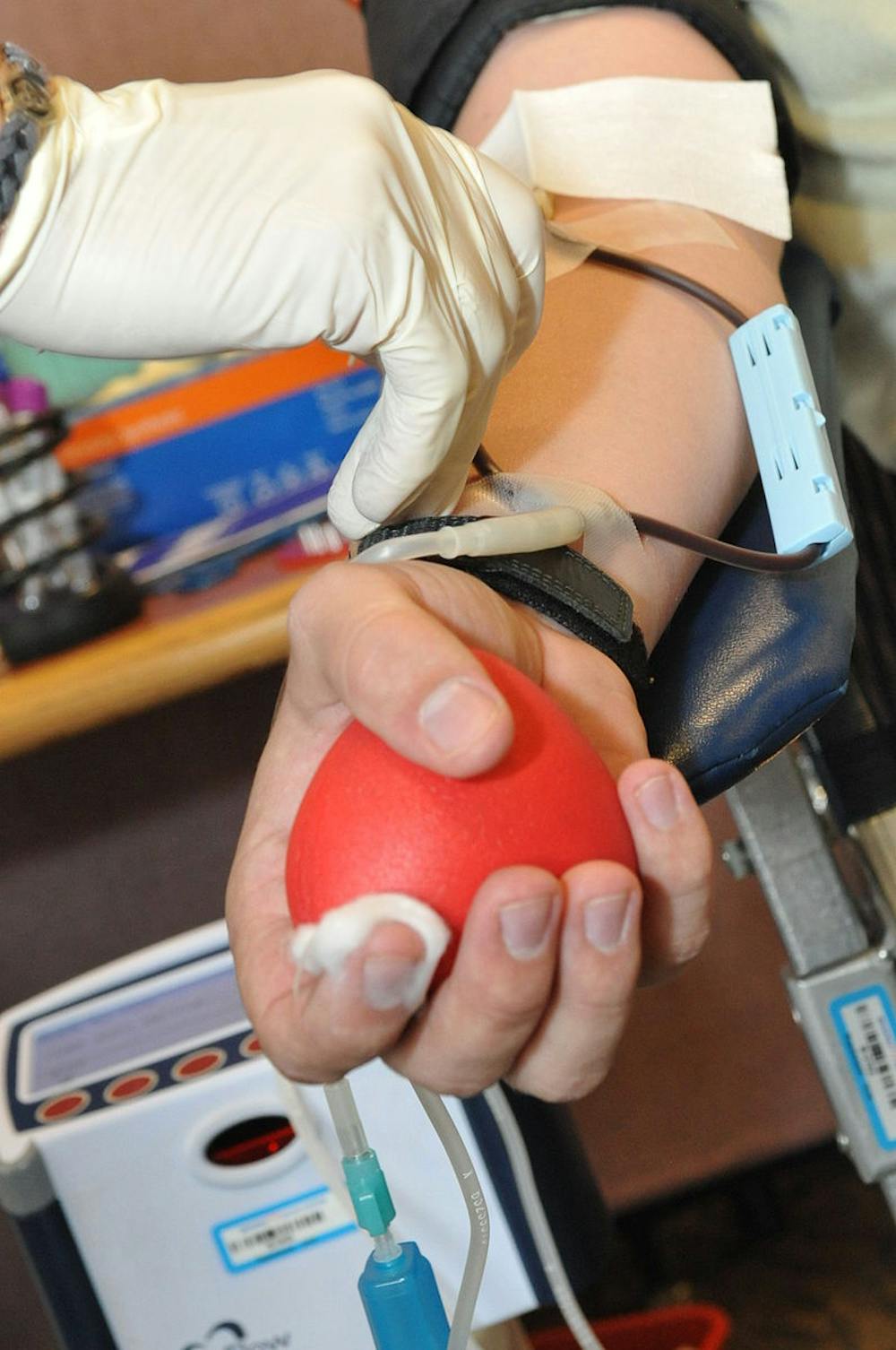The coronavirus (COVID-19) outbreak has decimated the nation’s blood supply. Amid the closures of schools, churches and other organizations, thousands of blood drives nationwide are being canceled at an unprecedented rate.
In addition, social distancing guidelines and shelter-in-place orders have kept people away from blood donation centers. Yet individuals battling life-threatening conditions still depend on a stable blood supply.
Because of the current blood supply shortage, the Food and Drug Administration (FDA) is significantly easing its recommendations for blood donations from gay and bisexual men. On April 2, the FDA reduced the amount of time men who have sex with men (MSM) like myself should wait before they give blood from one year to three months.
It is unfortunate that it took a public health crisis for some types of blood to be deemed good enough; the change would no doubt have been more effective if made three months before COVID-19 began canceling blood drives. It is also unfortunate that men who had sex with another man, even just once, were barred from donating blood at all until 2015. This lifetime ban was enacted in the 1980s, early in the AIDS epidemic, when little was known about HIV.
The FDA lowered the deferral period to three months after weeks of public pressure from elected officials and LGBTQ advocacy groups. GLAAD, for instance, collected over 20,000 signatures on a petition calling for an end to the FDA’s discriminatory and antiquated guidelines.
The FDA’s decision was triumphant but not perfect. The president of the Human Rights Campaign argued that “while this change is a step in the right direction... it is more critical than ever to prioritize science and facts over fear and bias,” alluding to the sinophobia that COVID-19 has unmasked in the U.S.
Federal policies reveal a similar stigma. The term “MSM” was introduced in 1992 in an attempt to avoid classifying male–male sexual behavior by sexual orientation. Yet this attempt thinly masks homophobia and biphobia, perpetuating stereotypes that tie gay sex to promiscuity and unsafe sex practices.
Why aren’t there exceptions for MSM who practice safe sex, for MSM in monogamous relationships or for MSM on anti-HIV medications like pre-exposure prophylaxis (PrEP)?
The FDA seems to ignore advances in HIV prevention, as well as those in donor testing. The Centers for Disease Control and Prevention (CDC) explains, “you can be confident you don’t have HIV” if a rapid test — done by pricking the finger or swabbing the gums — “comes back negative, and you haven’t had a possible exposure during the previous 3 months.”
But the FDA deferral period suggests that gay men can’t even wait the time it takes to put on a condom before having sex. Why should they have to swear off sex for three months before giving blood when an RNA test, according to the CDC, can detect the presence of HIV in the blood within 10 to 15 days of exposure to the virus? The World AIDS Campaign emphasizes that the RNA test “will continue to work... even months or years after the infection.” I’m no public health expert, but it appears that, with the RNA test, the deferral period could safely be shortened by a quarter.
Many argue that there shouldn’t be a deferral period at all, that such a policy is based not rightfully on risk but wrongfully on identity. Yes, non-MSM donors who have multiple sex partners can give blood. But the two leading risk factors in HIV transmission are sex with an HIV-positive partner and a history of male-to-male sexual contact. According to a study discussed in the FDA’s new guidance, these factors increased the risk of HIV transmission by 132-fold and 62-fold, respectively, whereas “the increase in risk for a history of multiple sexual partners of the opposite sex in the last year was 2.3-fold.”
Receptive anal sex is 18 times riskier than receptive vaginal sex. Furthermore, engaging in both topping and bottoming — many gay and bi men are versatile — “optimizes the spread of HIV in a way not seen in heterosexual couples” who have anal sex, the International Journal of Epidemiology found. A deferral period for anal sex would by default affect MSM. According to the CDC, the bottom partner is 13 times more likely to get infected than the top partner. Men who have sex with both men and women are less likely to have HIV than men who only report sex with men. Should the FDA relax the deferral period for tops and bi men? Probably not.
A 15-day deferral period (followed by an RNA test) for everyone, regardless of their sexuality, would be least discriminatory. This would, however, exacerbate the blood supply shortage. I lack the credentials to know whether a deferral period beyond 15 days for MSM is necessary, but the FDA should investigate differences among MSM and implement empirically sound changes to its policies accordingly.
Otherwise, the FDA upholds the decades-old portrayal of HIV as the “gay disease” — when the majority of sexually transmitted cases of HIV worldwide arise from heterosexual intercourse. As student activists at Brown University highlighted in 2018, the “stigma used to justify blood donation deferrals” engenders a “distrust of the healthcare system,” contributing to the prevalence of HIV among MSM.
“Research shows that perceived stigma may cause MSM to engage in more risky sexual behaviors that may increase the risk of contracting HIV,” they wrote. “Stigma-based policies may inadvertently increase risk for HIV contamination of the blood pool in the long run.”
So might the fact that HIV is one of five conditions where women are especially underrepresented in medical research. HIV is far more likely to spread from the male partner to the female partner, but the relative risk of anal to vaginal intercourse in women is unclear. By contrast, the risk of HIV transmission among MSM is well-established; as a result, doctors and public health workers reach out to that community with messaging about condoms and PrEP.
Yet women having unprotected anal sex, often those from low-income backgrounds, are less informed about such prevention methods. The risk of unprotected heterosexual anal sex remains unexplored, which reflects both homophobia and misogyny and increases the risk of HIV transmission. The FDA should ameliorate this discrepancy.
That could take time; given this cataclysm, the FDA could take swift action elsewhere. Currently, it is expediting blood plasma treatment for those seriously ill with COVID-19. This process — used during the Western African Ebola virus epidemic — involves giving patients plasma, or a derivative of it, from someone who has developed antibodies to a particular virus or bacteria in order to treat the infection. This therapy has not yet been shown to be effective in COVID-19, but it is promising. I applaud the FDA’s timely efforts to expand access to COVID-19 convalescent plasma.
However, the FDA issued guidelines on April 3 stating that “COVID-19 convalescent plasma must only be collected from recovered individuals if they are eligible to donate blood.” The next day, their revised recommendations for blood donation noted that, thanks to pathogen inactivation procedures, “no transmissions of HIV... have been documented through U.S.-licensed plasma-derived products in the past two decades.” If the FDA won’t recognize its homophobia, it should at least recognize this inconsistency. A gay COVID-19 survivor should not be forbidden from donating plasma to his husband dying of the virus.
The FDA should not deny queer men the opportunity to potentially save the lives of their family members — to save the lives of millions as the country faces a severe blood supply shortage. Within 60 days of COVID-19 no longer being a public health emergency, the FDA will replace its guidance with one that “incorporates any appropriate changes based on comments received.” Leave comments, and do research if you can. Remember that queer men aren’t the only ones who have HIV. Remember that we aren’t Mudbloods.
Rudy Malcom is a junior majoring in Writing Seminars from Port Washington, New York. He is a sexually active gay man and a News & Features Editor for The News-Letter.





